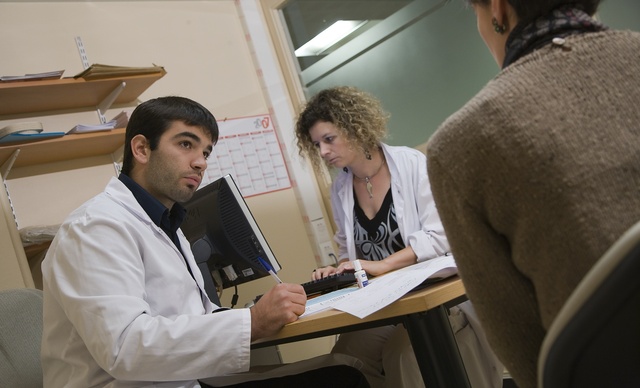Genetics consultations
Around 5% of cancers diagnosed develop due to a genetic predisposition. There are clinical signs warning of these hereditary forms of cancer, and these should encourage people likely to have a predisposition to seek a genetics consultation.

Physicians and genetics advisers from the Cancer Genetics department provide consultations for people with concerns about their genetic or hereditary risk. The Constitutional Genetics laboratory conducts tests to look for gene alterations that give a predisposition to breast and ovarian cancer (BRCA1, BRCA2, PALB2, FANC genes), to retinoblastoma, an eye tumor in young children (RB1 gene), to colon cancer or polyposis (MLH1, MSH2, MSH6, PMS2, MUTYH, APC, SMAD4, BMPR1A), stomach cancer (CDH1), rhabdoid tumors (SMARCB1), breast cancer (MET) and cancers of the blood (ATM).
Depending on your personal and family history, your physician may refer you for a genetics consultation with a genetics adviser and/or clinical geneticist.
First of all, or sometimes before the genetics consultation, your personal history and your family’s medical history will be established in the form of a genealogical tree. Once the genealogical tree has been analyzed, a genetics test may be offered. If relevant, this test will be conducted in the Genetics laboratory at Institut Curie and will look at whether there is an alteration in any of the genes that might predispose one to cancer. The laboratory conducts this study for individuals treated at Institut Curie as well as at other hospitals where there is no dedicated genetics consultation.
- Indications from the gene analysis: these indications are based on two types of criteria: individual criteria and family criteria. Some specific situations, such as some personal and/or family histories that indicate a predisposition or certain personal motivations, mean that a consultation may be sought even when these criteria are not met.
- The issues involved in a genetic analysis: if a genetic predisposition factor is identified, the individual concerned will be offered appropriate monitoring strategies and, in some situations, risk-reduction surgery. Genetic tests may also be conducted among the family to identify other members who may have a genetic risk and who could benefit from the same monitoring advice. This will reassure certain members of the family who do not carry the genetic predisposition. If no genetic alteration is identified, monitoring advice is also given to individuals who have undergone the analysis as well as their relatives.
- Genetic analyses: thanks to the development of very rapid DNA sequencing, people who may undergo genetic testing will be offered analyses of a range of predisposition genes. This strategy helps increase the chances of identifying a genetic risk in a family.
Anyone with concerns about their risk may contact the Genetics department to find out whether or not there is a need for genetic testing. However, given the number of consultation requests, which exceeds our capacity, consultations will be given in order of priority, depending on the reasons for the request. For this reason, we will first issue a questionnaire to establish personal and family history. Note that, for patients treated at Institut Curie, the genetic approach may be proposed straightaway by your Institut physicians.

